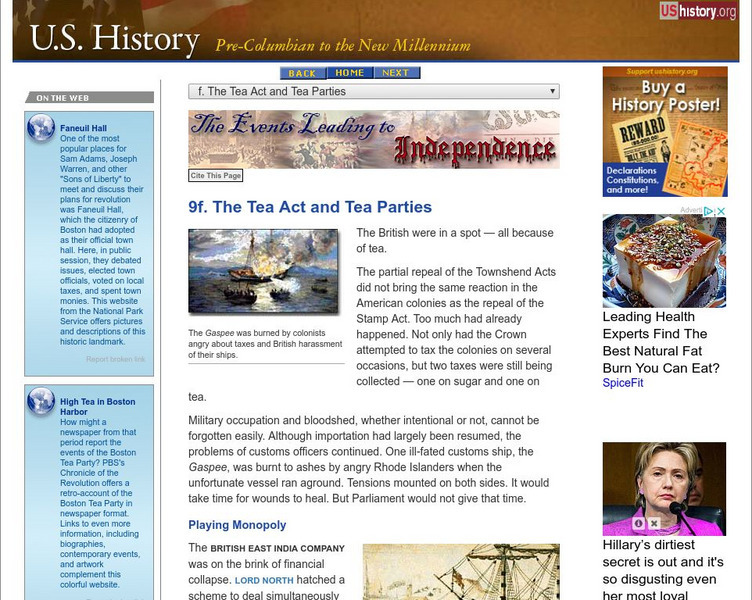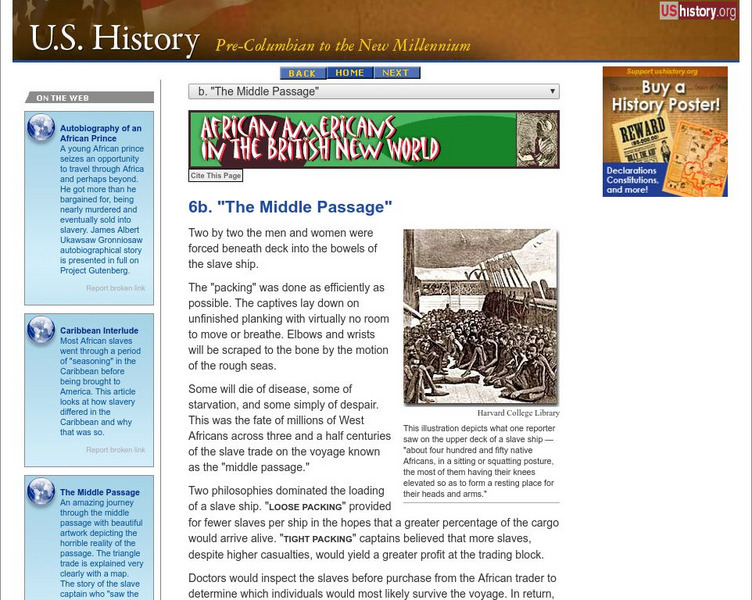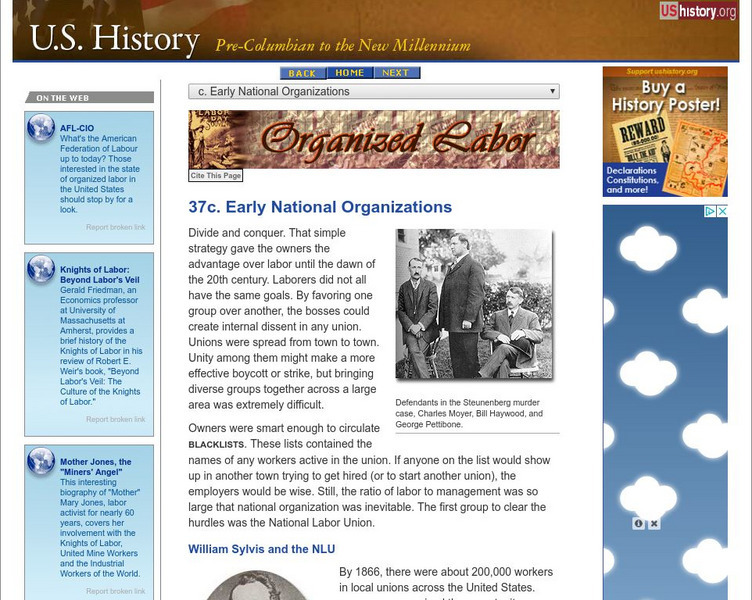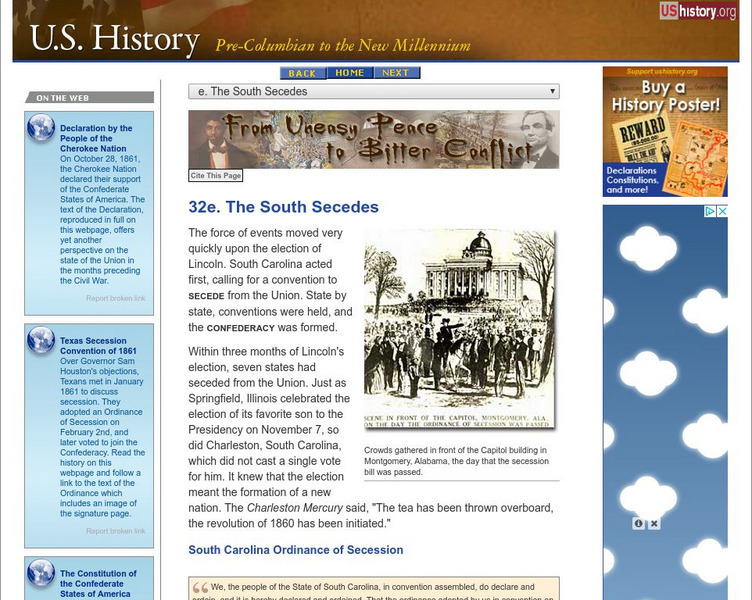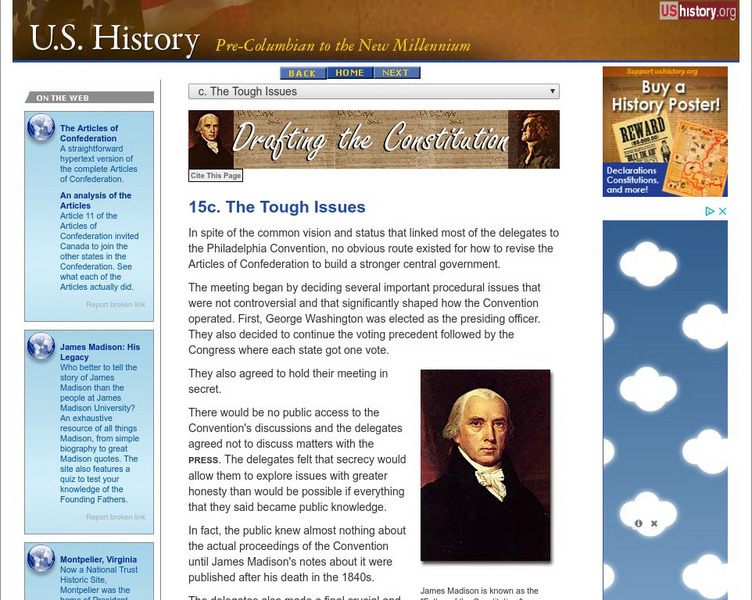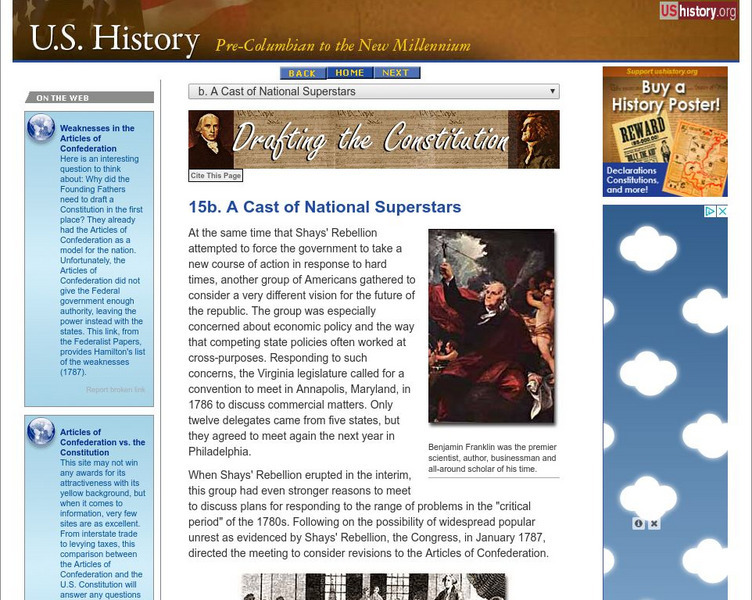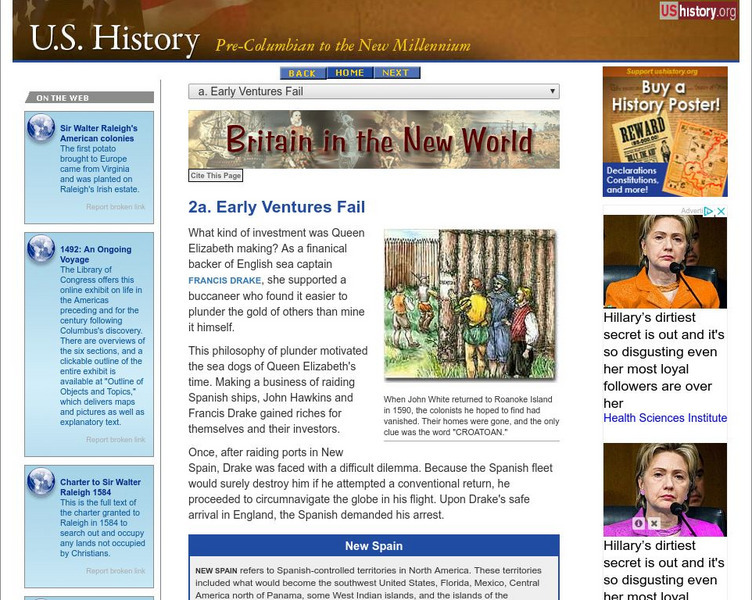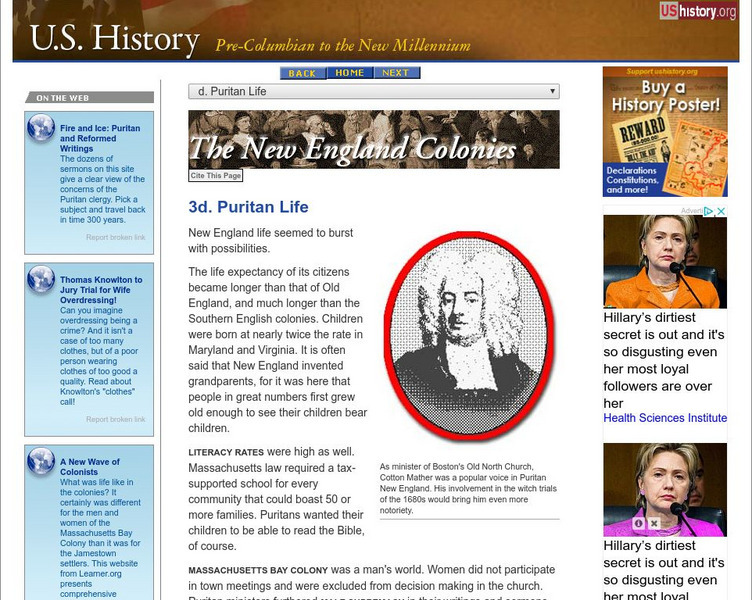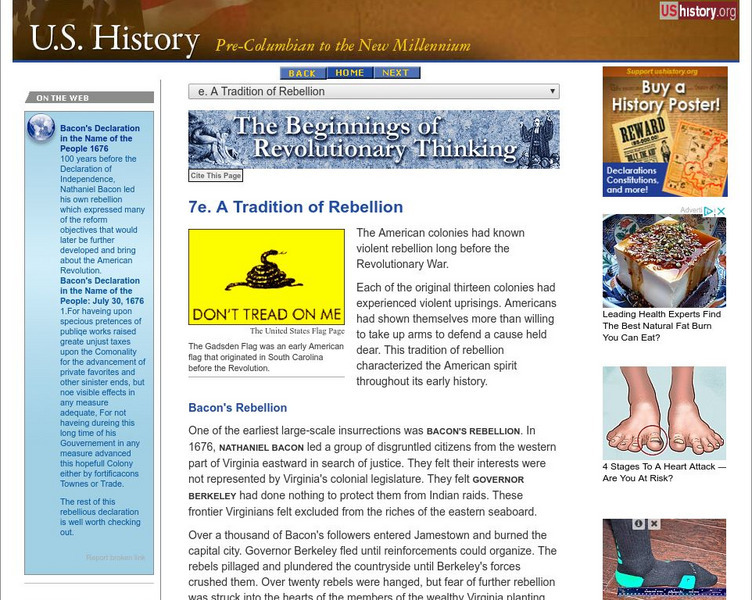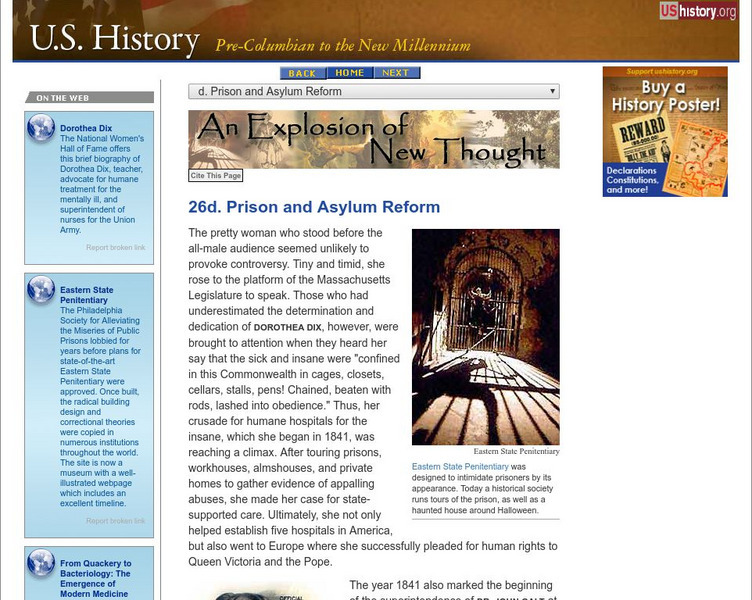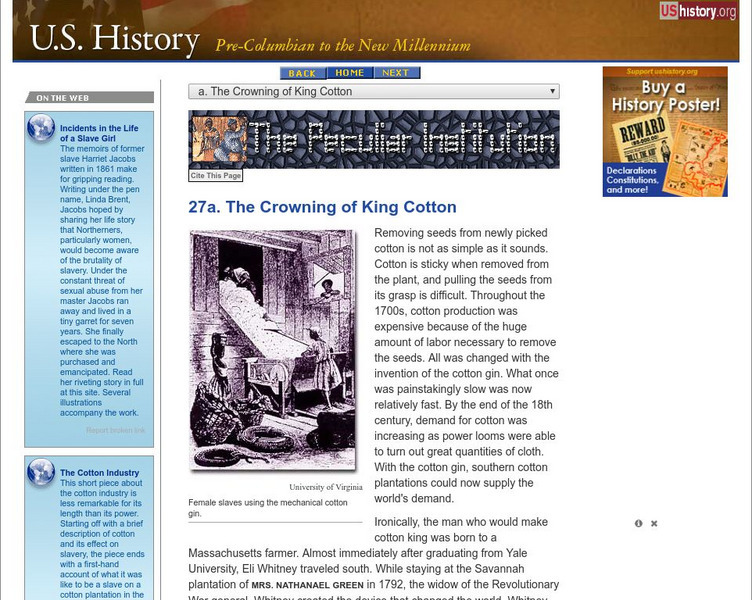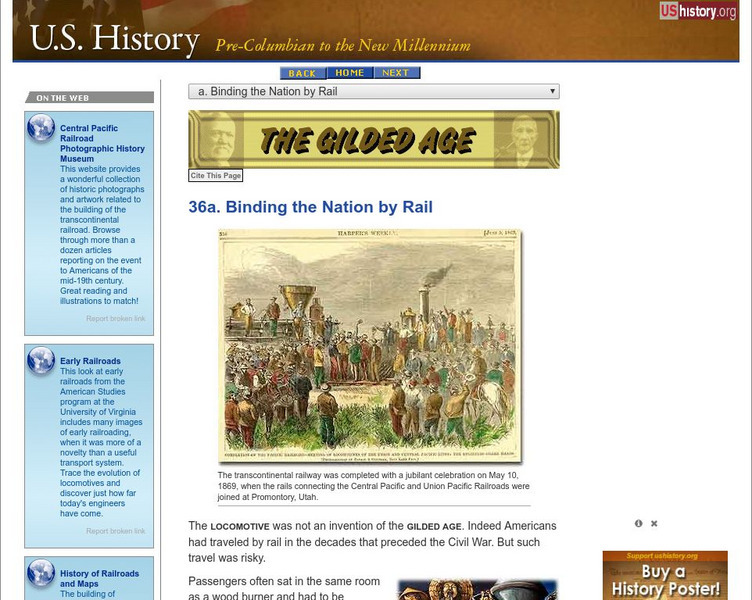Independence Hall Association
U.s. History: The Tea Act, 1773
This site provides background information on the Tea Act which led to the Boston Tea Party. Has links to other acts as well.
Independence Hall Association
U.s. History: The Tea Act and Tea Parties
Read the text of the Tea Act, passed by the British Parliament primarily as a way to rescue the failing British East India Company. Find out about the colonists' reactions to this tax, and read a first-hand account of the Boston Tea Party.
Independence Hall Association
U.s. History: A Federalist Stronghold: John Marshall's Supreme Court
John Marshall was the fourth Chief Justice of the Supreme Court, but his decisions, especially in Marbury v Madison, set the influence of the Court for the next many decades. Read about Marshall's decisions and why they were so important.
Independence Hall Association
U.s. History: Hudson River School Artists
A discussion of the Americanization of painting in the early 1800s with the artists who were part of the Hudson River School of Art. Read about the new audience for their paintings and the subject matter.
Independence Hall Association
U.s. History: The Dred Scott Decision
Read the terms of the Dred Scott decision which determined that the Missouri Compromise was unconstitutional. See why this decision was so controversial and completely unacceptable to the northerners, thus driving an additional wedge...
Independence Hall Association
U.s. History: African Americans in the British New World: The Middle Passage
A description of the Middle Passage, the leg of the triangular trade that brought slaves from Africa to America. Read descriptions of the way slaves were transported in the ships across the ocean.
Independence Hall Association
U.s. History: Early National Organizations
As early as 1866 a national union grew from the multitude of local unions in the country. Read about the growth of stronger unions, and find out what their goals were. See why the Haymarket Square Riot had an effect on unionization.
Independence Hall Association
U.s. History: The South Secedes
South Carolina was the first to secede upon the election of Abraham Lincoln in 1860. Read about the secession of more states, the election of a president of the new Confederate States of America, and a last ditch effort to save the union.
Independence Hall Association
U.s. History: The Expansion of the Vote: A White Man's Democracy
Read about how the ability to vote changed from requiring the ownership of property to almost complete enfranchisement of white males by 1840. There was disenfranchisment of women and free blacks in the same period of time.
Independence Hall Association
U.s. History: The Tough Issues
Read about the change of plans when delegates to the Philadelphia convention decided to write a new constitution to replace the Articles of Convention. See the ideas delegates had to address concerns of large and small states.
Independence Hall Association
U.s. History: A Cast of National Superstars
A brief look at some of those who served as delegates to the Philadelphia Convention, which morphed into a constitutional convention. Pay attention to the class of people who made up the delegates.
Independence Hall Association
U.s. History: The Loyalists
Perhaps the Loyalists had some concrete reasons to support staying part of the British Empire. Read about who was a Loyalist and why. Particularly interesting is the reason behind so many slaves supporting Britain and what happened to...
Independence Hall Association
U.s. History: Britain in the New World: Early Ventures Fail
Several Englishmen sailed to the New World to establish settlements for England. Read about Sir Humphrey Gilbert's fate, and the mystery of Roanoke. Follow Sir Francis Drake on the map as he circumnavigated the globe.
Independence Hall Association
U.s. History: New England Colonies: Puritan Life
Find out about the life of the Puritans. Education was important, as well as church attendance. Read about the forms of punishment, and the ways Puritans had fun.
Independence Hall Association
U.s. History: Beginnings of Revolutionary Thinking: A Tradition of Rebellion
Bacon's Rebellion was just the beginning of large-scale rebellions carried out by colonists when they felt they received no help from the colonial courts. Read about the men in colonies throughout America who protested the courts' favors...
Independence Hall Association
U.s. History: New France
This site has a good description of the differences between the French settlements in New France and the British colonies in America. Read about the rights of the French colonists as opposed to those of the English colonists.
Independence Hall Association
U.s. History: Growing Opposition
George Washington's cabinet had strong personalities with often opposing opinions. Read about the differences between Alexander Hamilton and Thomas Jefferson in regard to Hamilton's financial policies for the new country. See why these...
Independence Hall Association
U.s. History: Claiming Victory From Defeat
A list of the reasons for the War of 1812 is followed by an overview of the important battles of the war and the terms of the treaty that ended it.
Independence Hall Association
U.s. History: Jacksonian Democracy and Modern America
An overview of the ideals of the new Democratic Party under Andrew Jackson, and later Martin Van Buren. Read about the new two-party system with the formation of the Whig Party. See how Jacksonian Democracy molded American political...
Independence Hall Association
U.s. History: A Strong Presidency
See how Andrew Jackson handled his role as president and advocate of the common man. His using the spoils system had an altruistic beginning, but it soon became a function of corruption.
Independence Hall Association
U.s. History: The South Carolina Nullification Controversy
The nullification controversy began as an economic dispute between north and south. See how the question about tariffs resulted in a states' rights issue in South Carolina. Read about what President Andrew Jackson was going to do about...
Independence Hall Association
U.s. History: Prison and Asylum Reform
Two of the social movements of the 1830s and 1840s looked to improving the lot of the mentally ill and those in prison. Read about Dorothea Dix who crusaded for humane treatment and hospitals for the insane. Several others worked to make...
Independence Hall Association
U.s. History: The Crowning of King Cotton
Read how an invention made it possible to increase the amount of cotton available for export, thus leading to an increase in the number of acres planted in cotton, and resulting in the need for more and more slaves. Before the invention...
Independence Hall Association
U.s. History: Binding the Nation by Rail
Read about the explosive growth of railroad track across the United States after the Civil War. Find out about the building of the Transcontinental Railroad, the men who made fortunes from the railroads, and the first American regulatory...



